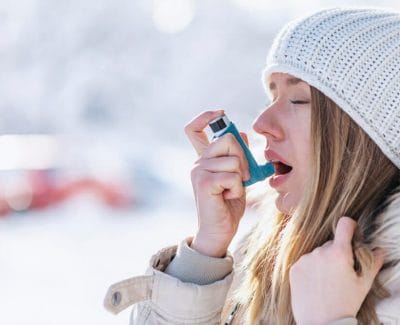Introduction
Asthma, allergic rhinitis and rhinosinusitis (sinusitis) all cause airway inflammation. Asthma affects the lower airway (the bronchi and lungs). Rhinitis and sinusitis affect the upper airway (the nose and sinuses). Unfortunately, many patients suffer from two or all three of these conditions. In such a case, a flare-up in one location, may cause worsening of all airway symptoms.
Frequency
In the US population, 15-30% of adults have allergic rhinitis, 12.5% of adults are diagnosed with sinusitis and 25 million US adults and children are affected by asthma.
- Of individuals with asthma, up to 38% have allergic rhinitis.
- Of individuals with chronic sinusitis (CRS), 2-66% suffer from asthma.
- Of individuals with CRS that persists despite medical and surgical management, 68-91% suffer from asthma.
Treatments
Treatments for sinusitis, allergy or asthma may alleviate symptoms of the other diseases. However, inadequate treatment can lead to worsening of one or more. Treatment of these conditions may require multiple specialists. In addition to medical management, surgery may also be of benefit. Endoscopic sinus surgery for the treatment of sinusitis has been shown to improve both sinusitis and asthma control.
Medical treatment of allergic rhinitis may include one or more medications. Options include nasal saline rinses, nasal steroid sprays, nasal antihistamine sprays and oral antihistamines. Immunotherapy includes allergy shots (SCIT) and drops (SLIT). Immunotherapy may be used in the long-term management of allergic rhinitis (See Allergic Rhinitis).
The goal for asthma management is to prescribe the lowest dose of medication that still maintains symptom control. Medications for asthma management may include beta-2 agonists and steroids. Short-acting beta-2 agonists act at the lowest level. Inhaled steroids and/or long-acting beta-2 agonists are used at the intermediate level. Oral steroids can be added to the above medications for more severe disease. New medications have been recently developed that benefit patients with the most severe asthma. These biological agents are antibodies that are used to modify your immune reaction. They are currently reserved for severe asthma and/or specific types of asthma. Omalizumab is an antibody against IgE (antibodies responsible for allergies). The drug acts to reduce your body’s ability to react to allergies. This ultimately reduces inflammation associated with allergies. Omalizumab is indicated in patients with asthma and allergic rhinitis. Some studies have shown that omalizumab may be able to impact chronic sinusitis in patients with asthma. However, no indications currently exist for the use of this drug outside of asthma. Three biologic agents are available for eosinophilic-type asthma. Mepolizumab, reslizumab, and benralizumab are antibodies that target IL-5 or the IL-5 receptor. These medications have been shown to reduce the frequency of asthma flare-ups. Most recently dupilumab has been approved for the treatment of chronic sinusitis with nasal polyps. Dupilumab blocks IL-4 and IL-13, proteins which play a role in inflammation.
Aspirin-Exacerbated Respiratory Disease (AERD)
AERD stands for aspirin-exacerbated respiratory disease. AERD is the combination of asthma, sinusitis with polyps and allergy to aspirin/NSAIDs. It was formerly known as Samter’s triad. Patients with AERD often develop asthma as an adult. Management of AERD is similar to the management of concurrent asthma and sinusitis as above. One additional management option is aspirin desensitization (See Aspirin Desensitization). The process involves introduced increasing amounts of aspirin to the body. This allows the body to build a tolerance to the medication. Aspirin desensitization is often performed by an allergist. It helps to address the inflammation that promotes asthma and sinusitis flare-ups. The effects of specific diets, such as a low-salicylate diet, are also being investigated in the treatment of AERD.
Summary
Many patients suffer from both sinusitis and asthma, as well as allergic rhinitis. All three are inflammatory conditions that affect the airway. Treatment options are carefully selected and individualized for each patient.
Copyright © 2020 by the American Rhinologic Society

